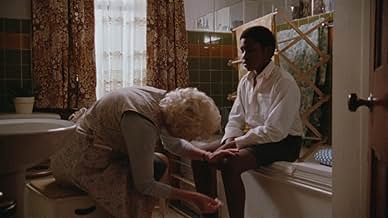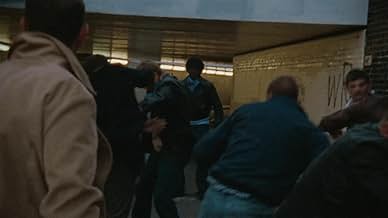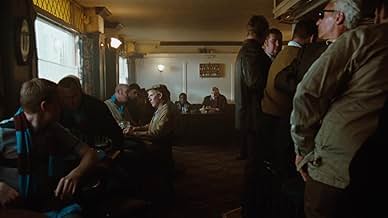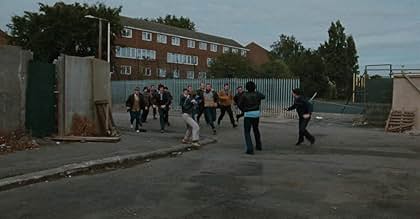Cass
- 2008
- 1h 48m
IMDb RATING
6.4/10
6.7K
YOUR RATING
An orphaned Jamaican baby is adopted by an elderly white couple and brought up in an all white area of London and becomes one of the most feared and respected men in Britain. Based on a true... Read allAn orphaned Jamaican baby is adopted by an elderly white couple and brought up in an all white area of London and becomes one of the most feared and respected men in Britain. Based on a true story.An orphaned Jamaican baby is adopted by an elderly white couple and brought up in an all white area of London and becomes one of the most feared and respected men in Britain. Based on a true story.
- Director
- Writers
- Stars
- Director
- Writers
- All cast & crew
- Production, box office & more at IMDbPro
Featured reviews
As a contemporary of Pennant, and veteran of the 1970's and 1980's terrace culture,I was keen for this film to succeed. Sadly, with some good intentions, it fails, and joins the other flawed attempts to recreate the halcyon days of the hooligan. The authenticity of the background to the film is often well observed. But Director Jon Baird fails to have the expertise, or I suspect the budget, to faithfully realise the period..
Pennant's biography is well written, and a good read. It also covers over 40 years. A 108 minute screen running time, was always likely to be crippled by compromise, vignette and crude symbolism, and so it turns out. His story does have dramatic potential and sociological significance but neither Baird nor Pennant have the discipline or know- how to deliver it.
For lovers of football violence, there is not a lot of it. Three 20 a side rucks with Wolves, Leeds and Newcastle are the set pieces. For an 18 Certificate the grizzly reality of these confrontations is pretty sanitised giving succour to the dreamy, romantic retrospection that it was just like minded boys fighting, and finding a sense of family in hooligan gangs.
The key scene when one of Pennants lieutenants gets jumped by three Arsenal thugs and is slashed to ribbons needing 1000 stitches is strangely understated .Its setting is grimly authentic, three against one, the assailants armed, no chance of defence or escape for the victim. Yet we see only the healed welts on the victims face some time later, not the grim reality of a cowardly, bloody attack.
As a child the casual racism and bullying which "Carol" suffers, alongside a complete lack of personal identity, is well observed. Bravely, time is also found for racism he suffers at the hands of a black Rasta in jail. When his mother dies unexpectedly, his remorse at not having told her how much he loved her is genuinely poignant. Sadly though, these promising scenes are sketched in the same shorthand as the violent ones , which is very frustrating.
The "rucks" themselves are fleshed out with some ageing faces from the past, Bill Gardener,Mark Chester from Stoke, and Gilly from Wolves amongst them. It does not help the realism of the scenes to have time worn middle aged men in amongst what was a pretty exclusively young crowd at the time. This sop to some old boys to enable them to relive their youth is pretty risible. Equally Pennant himself appears uncredited as a bouncer alongside Frank Bruno, also uncredited.West Ham's North Bank and Chicken Run are not mentioned once, the South Bank gets two unreferenced name checks.
One of the best moments in the book is when Pennant steps in to save a random black kid from getting a beating from some racist skinheads only to discover that he has saved Frank Bruno! Pennants close subsequent links with the boxing fraternity are only dealt with in short hand in the film and his chance meeting with a similarly incarcerated Ambrose Mendy left out all together, as is, inexplicably, his "saving" of Bruno.
Virtual unknown Nonso Anozeo, successfully carries off the role of the adult Pennant.Tamer Hassan plays a convincing cameo as boxer Ray.. Otherwise the ensemble provides background only to the main events. However the fundamental rush of football hooliganism, the massed clashes of sometimes several thousand protagonists is missing. As others have found ,it is very difficult to recreate with so many of the old grounds gone. What grounds and stands do remain are out of bounds to "hoolie" film makers from clubs eager to protect their sanitised reputation.
The hackneyed use of Thatcherite film clips as she pronounces on a subject she knows nothing about is cheap and adds nothing. Amusingly, shots of the infamous Millwall riot at Luton are shown twice, but Millwall, the ICF's great rivals are not mentioned once.
As a stand alone bio pic this is poor. Pennant is no Mandela. If you were there, there is enough to keep your interest but not enough to win your praise. In aiming to be more than a "hoolie film", this bio pic tries to achieve much, but ultimately falls victim to its own over ambition and vanity.
Pennant's biography is well written, and a good read. It also covers over 40 years. A 108 minute screen running time, was always likely to be crippled by compromise, vignette and crude symbolism, and so it turns out. His story does have dramatic potential and sociological significance but neither Baird nor Pennant have the discipline or know- how to deliver it.
For lovers of football violence, there is not a lot of it. Three 20 a side rucks with Wolves, Leeds and Newcastle are the set pieces. For an 18 Certificate the grizzly reality of these confrontations is pretty sanitised giving succour to the dreamy, romantic retrospection that it was just like minded boys fighting, and finding a sense of family in hooligan gangs.
The key scene when one of Pennants lieutenants gets jumped by three Arsenal thugs and is slashed to ribbons needing 1000 stitches is strangely understated .Its setting is grimly authentic, three against one, the assailants armed, no chance of defence or escape for the victim. Yet we see only the healed welts on the victims face some time later, not the grim reality of a cowardly, bloody attack.
As a child the casual racism and bullying which "Carol" suffers, alongside a complete lack of personal identity, is well observed. Bravely, time is also found for racism he suffers at the hands of a black Rasta in jail. When his mother dies unexpectedly, his remorse at not having told her how much he loved her is genuinely poignant. Sadly though, these promising scenes are sketched in the same shorthand as the violent ones , which is very frustrating.
The "rucks" themselves are fleshed out with some ageing faces from the past, Bill Gardener,Mark Chester from Stoke, and Gilly from Wolves amongst them. It does not help the realism of the scenes to have time worn middle aged men in amongst what was a pretty exclusively young crowd at the time. This sop to some old boys to enable them to relive their youth is pretty risible. Equally Pennant himself appears uncredited as a bouncer alongside Frank Bruno, also uncredited.West Ham's North Bank and Chicken Run are not mentioned once, the South Bank gets two unreferenced name checks.
One of the best moments in the book is when Pennant steps in to save a random black kid from getting a beating from some racist skinheads only to discover that he has saved Frank Bruno! Pennants close subsequent links with the boxing fraternity are only dealt with in short hand in the film and his chance meeting with a similarly incarcerated Ambrose Mendy left out all together, as is, inexplicably, his "saving" of Bruno.
Virtual unknown Nonso Anozeo, successfully carries off the role of the adult Pennant.Tamer Hassan plays a convincing cameo as boxer Ray.. Otherwise the ensemble provides background only to the main events. However the fundamental rush of football hooliganism, the massed clashes of sometimes several thousand protagonists is missing. As others have found ,it is very difficult to recreate with so many of the old grounds gone. What grounds and stands do remain are out of bounds to "hoolie" film makers from clubs eager to protect their sanitised reputation.
The hackneyed use of Thatcherite film clips as she pronounces on a subject she knows nothing about is cheap and adds nothing. Amusingly, shots of the infamous Millwall riot at Luton are shown twice, but Millwall, the ICF's great rivals are not mentioned once.
As a stand alone bio pic this is poor. Pennant is no Mandela. If you were there, there is enough to keep your interest but not enough to win your praise. In aiming to be more than a "hoolie film", this bio pic tries to achieve much, but ultimately falls victim to its own over ambition and vanity.
Way more than just a football thuggery story, as our protagonist has to weave his way from being an orphaned Black kid (Nonso Anozie) raised by White foster parents in a predominantly White London east end neighborhood to being a self-respected man with a job, family and peace of mind. Along this most circuitous route, he encounters racism by both Whites and Blacks: by Whites because of his color and by Blacks because of his cockneyed "White" sounding speech patterns and by his reluctance to "go Black" to his so-called African/Jamaican roots. He is quite content to merely be himself and is fully comfortable with his Caucasian foster parents who brought him up with love and attention. He cares far more about his family and his mates than for some artificial and ephemeral political/racial cause. The jail cell scene with the back and forth dialogue between Cass and his "Rasta-ish" cell-mate bears this point out.
But his issues with the aforementioned football thuggery with its concomitant need for constant revenge through violence is keeping him from the realization of his true inner self, the real man he wants to be. The thrust of this film deals with how, over long periods of time, he must manage to extricate those inner demons in order to achieve any sort of lasting peace. And a superlative job indeed is done to portray this metamorphosis by Jon Baird & co., especially the lead role by Nonso. No fancy existential/psychological drama in this hard-hitting, straight-forward piece: just a man in search of himself with the hopes of finding some semblance of a peaceful, fulfilling existence.
But his issues with the aforementioned football thuggery with its concomitant need for constant revenge through violence is keeping him from the realization of his true inner self, the real man he wants to be. The thrust of this film deals with how, over long periods of time, he must manage to extricate those inner demons in order to achieve any sort of lasting peace. And a superlative job indeed is done to portray this metamorphosis by Jon Baird & co., especially the lead role by Nonso. No fancy existential/psychological drama in this hard-hitting, straight-forward piece: just a man in search of himself with the hopes of finding some semblance of a peaceful, fulfilling existence.
There's many British gangster movies / football hooligan movies. Cass i certainly a candidate for being one of the better ones out there. I never go into story lines etc and try to keep my reviews brief and to the point here on IMDb. Basically if your a fan of the better UK movies like Football Factory, Green Street, Rise Of The FootSoldier, Clubbed etc then there's no way you will not enjoy this. Being based on a true story makes it even more engrossing for me and it's one i would recommend hence me giving it 8 stars.
One downside is that it gives off a bit of a budget look... almost older then it is look with the visuals but its a solid British flick. Deffo check it out.
One downside is that it gives off a bit of a budget look... almost older then it is look with the visuals but its a solid British flick. Deffo check it out.
With The Football Factory still reverberating in the memory, it's difficult to get as excited about a film like Cass as one would like; a piece living in the still-recent shadow of such a film whilst calling on direct influence from the likes of 2005's Green Street as well as bits and pieces of an older crime film, albeit disconnected from hooliganism, in the form of De Palma's Carlito's Way. Indeed, Cass' director is a certain Jon Baird; a man who worked on Green Street as an associate producer - his film here formulating into a similar tale of a "white crow" and their consequent exposure to a world around them they are inherently alien to. This, before undergoing a gradual inception into it. It all smells suspiciously of said example's Elijah Wood character, an American getting lost amidst the sociological norms of a hooligan-dominated zone and having to undergo this process of initiation so as to get by. A similar framework of someone as much-an outcast to their surroundings getting involved, before realising the nature of one's ways and one's life, is told here, only over the space of about thirty years and not as engagingly.
The film follows that of true-to-life criminal-come-hooligan turned author Cass Pennant; a man whose tale here is as true as they tell us it is, and yet doesn't carry that naturalistic sense that it is someone's life actually progressing from one point to another. Told in glaringly episodic fashion, a fresh popular song peppering the soundtrack every time the era jumps forward, Nonso Anozie plays the titular lead: a man of Jamaican descent adopted at a young age by a white London couple in the 1960s, and brought up as their own in decent, friendly home-set surroundings. As a youngster, he is marginalised and ridiculed for his colour; a safe haven arriving in the form of a local public house practically run by the fans of West Ham United, whom welcome him in if it means he's a fan of the team and help him out when he runs into those racists outside of hours. This sense of unity is epitomised by the singing in unison those within carry out; football shirts and scarves in the club's colours reiterating this sense of being at one. In an attempt to instill an early sense of where we're at, we observe The Football Factory's own Tamer Hassan doing what the character of Billy Bright did in Nick Love's said 2004 film, when pub-set shenanigans give way to the intimidating of a young kid who thinks he can intermingle with those above his weight.
Cass is apprehensive of going to football to begin with; not even his father's reiteration that the stars of the day and certain World Cup winners will be there appears to convince him, but he rides it out and then discovers a taste for what lurks beneath the following of a football team. Thus that of what we see of Cass' life is launched, his descent through hooliganism and organised violence; a world in which the attraction of a footballing 'firm' facing off against another is more appealing than the match itself. West Ham's biggest rivals in this regard are Leeds United, not out of geography nor the fact they are both of an immensely skilled nature alá the Real Madrid-Barcelona ties, but because these two fight the hardest.
What transpires are several 'bits' and pieces of Pennant's life: his first feel of football violence; his going to prison; his meeting of a girl; his getting wind of a business venture, none of it much more than slightly interesting and all of it propped up with a lacklustre script seeing dialogue made up of insults and lots of four letter words predominantly coming from that of the males therein with meek moral out-linings accompanying spots of common sense exuded by the females. Director Baird strikes us as someone doing their utmost to make a good film, maturely; his veering off down a route to encompass a sub-plot inspired by Carlito's Way, as well as the fact Cass is later released from prison to the same sound of pomp and circumstance that saw Alex De Large enter prison in Kubrick's A Clockwork Orange, suggests the man has seen his fair share of films; enjoyed them and desperately wanted to make his own whilst pay homage, but there is no cumulative whole around which everything gels. Its politics may be in the right place but the film's overall feel as you both watch it and absorb it is that of unsmooth; as if it's fumbling around in the dark for the right buttons, sometimes finding them, but doing its utmost overall to do the right thing.
The film follows that of true-to-life criminal-come-hooligan turned author Cass Pennant; a man whose tale here is as true as they tell us it is, and yet doesn't carry that naturalistic sense that it is someone's life actually progressing from one point to another. Told in glaringly episodic fashion, a fresh popular song peppering the soundtrack every time the era jumps forward, Nonso Anozie plays the titular lead: a man of Jamaican descent adopted at a young age by a white London couple in the 1960s, and brought up as their own in decent, friendly home-set surroundings. As a youngster, he is marginalised and ridiculed for his colour; a safe haven arriving in the form of a local public house practically run by the fans of West Ham United, whom welcome him in if it means he's a fan of the team and help him out when he runs into those racists outside of hours. This sense of unity is epitomised by the singing in unison those within carry out; football shirts and scarves in the club's colours reiterating this sense of being at one. In an attempt to instill an early sense of where we're at, we observe The Football Factory's own Tamer Hassan doing what the character of Billy Bright did in Nick Love's said 2004 film, when pub-set shenanigans give way to the intimidating of a young kid who thinks he can intermingle with those above his weight.
Cass is apprehensive of going to football to begin with; not even his father's reiteration that the stars of the day and certain World Cup winners will be there appears to convince him, but he rides it out and then discovers a taste for what lurks beneath the following of a football team. Thus that of what we see of Cass' life is launched, his descent through hooliganism and organised violence; a world in which the attraction of a footballing 'firm' facing off against another is more appealing than the match itself. West Ham's biggest rivals in this regard are Leeds United, not out of geography nor the fact they are both of an immensely skilled nature alá the Real Madrid-Barcelona ties, but because these two fight the hardest.
What transpires are several 'bits' and pieces of Pennant's life: his first feel of football violence; his going to prison; his meeting of a girl; his getting wind of a business venture, none of it much more than slightly interesting and all of it propped up with a lacklustre script seeing dialogue made up of insults and lots of four letter words predominantly coming from that of the males therein with meek moral out-linings accompanying spots of common sense exuded by the females. Director Baird strikes us as someone doing their utmost to make a good film, maturely; his veering off down a route to encompass a sub-plot inspired by Carlito's Way, as well as the fact Cass is later released from prison to the same sound of pomp and circumstance that saw Alex De Large enter prison in Kubrick's A Clockwork Orange, suggests the man has seen his fair share of films; enjoyed them and desperately wanted to make his own whilst pay homage, but there is no cumulative whole around which everything gels. Its politics may be in the right place but the film's overall feel as you both watch it and absorb it is that of unsmooth; as if it's fumbling around in the dark for the right buttons, sometimes finding them, but doing its utmost overall to do the right thing.
Excellent biopic and and great acting. The usual familiar British faces with your typical violence and swearing. Cass is played well and is a good portrayal of 1980s Britain. If you like football hooligan films you will like this.
Did you know
- TriviaThe extras in the fight scenes are people who were nearly exclusively those who are involved or were involved in the London underworld apart from certain stunt-men. after setting up the Leeds fight scene for most of the day the extras had had one too many beers got a little carried away and one of the stars got his head cut open with a punch. at that Cass and some others had to step in as to this day they work security at night clubs and are used to confrontations.
- GoofsWhen the two ladies are talking outside a house with Cass in the pram, the subtitle shows 'Slade Green, London 1958'. Slade Green is now in the London Borough of Bexley, but in 1958 would have been part of Kent as the current Greater London was not formed until 1965. Also, the house types don't exist and have never existed in the Slade Green area, neither does the blue railway footbridge. Slade Green would have in 1958 consisted of a couple of farms, a railway depot, some railway worker houses and some newer council houses.
- SoundtracksThe Israelites
Written and performed by Desmond Dekker
- How long is Cass?Powered by Alexa
Details
- Release date
- Country of origin
- Official site
- Language
- Also known as
- Untitled Cass Pennant Project
- Filming locations
- The Britannia, 2 Plaistow Grove, Stratford, London, England, UK(South Bank Crew pub - internals and externals)
- Production companies
- See more company credits at IMDbPro
Box office
- Budget
- £1,000,000 (estimated)
- Gross worldwide
- $241,369
- Runtime1 hour 48 minutes
- Color
- Sound mix
- Aspect ratio
- 1.66 : 1
Contribute to this page
Suggest an edit or add missing content































